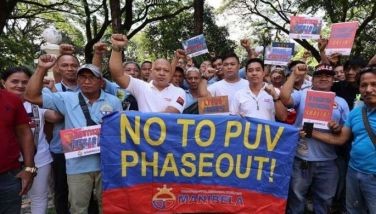Children bear brunt of climate change
MANILA, Philippines - Children will bear the brunt of climate change as more than half a billion children live in areas with extremely high flood occurrence and 160 million in high drought severity zones, the United Nations Children’s Fund (UNICEF) reported ahead of the 21st United Nations climate change conference, known as COP21.
In the report “Unless we act now: The impact of climate change on children,” UNICEF said children living in areas with extremely high flood occurrence and high drought severity zones are highly exposed to the impacts of climate change.
It said that of the 530 million children in the flood-prone zones, about 300 million live in countries where more than half the population lives in poverty, surviving on less than $3.10 a day. Of those living in high drought severity areas, 50 million are in countries where more than half the population lives in poverty.
“The sheer numbers underline the urgency of acting now,” said UNICEF executive director Anthony Lake. “Today’s children are the least responsible for climate change, but they, and their children, are the ones who will live with its consequences. And, as is so often the case, disadvantaged communities face the gravest threat.”
Climate change means more droughts, floods, heat waves and other severe weather conditions. UNICEF is underlining that these events can cause death and devastation, and can also contribute to the increased spread of major killers of children, such as malnutrition, malaria and diarrhea.
This can create a vicious circle, according to the agency, a child deprived of adequate water and sanitation before a crisis will be more affected by a flood, drought, or severe storm, less likely to recover quickly, and at even greater risk when faced with a subsequent crisis.
The report finds that the vast majority of children living in areas at extremely high risk of floods are in Asia, including the Philippines and the majority of those in areas at risk of drought are in Africa.
Meanwhile, world leaders gathering in Paris for COP21 held from today to Dec. 11 will seek to reach agreement on cutting greenhouse gas emissions, which most experts say is critical to limiting potentially catastrophic rises in temperature.
“We know what has to be done to prevent the devastation climate change can inflict. Failing to act would be unconscionable,” Lake said. “We owe it to our children – and to the planet – to make the right decisions at COP21.”
Sen. Loren Legarda, Senate committee on climate change head, said the country could not afford a failure in the Paris talks to craft a universally binding agreement to limit temperature increase below two degrees Celsius.
“If nations will not agree and commit to a climate deal that will limit global warming to 1.5 degrees Celsius, we will experience more of Ondoy, Pepeng, Yolanda, habagat-induced rains, and stronger episodes of El Niño,” she warned.
The 2015 Paris Climate Conference is a crucial event for the future of humanity and of the world, she added.
Legarda also reiterated that the United Nations’ study found economic losses from disasters are ‘out of control.’
“We should reverse this situation. Resilience should be at the core of our development policies and strategies. In climate and disaster risks, there may be no second chances,” Legarda said. – With Christina Mendez
- Latest
- Trending





























